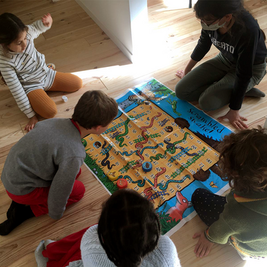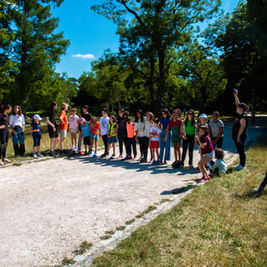
A laboratory school is a school affiliated to a university department or a teacher training structure.
Three complementary activities are associated with a lab school: teaching, training and research. Because of this structure, a link is naturally created between education and research, which allows the school to “Develop and test new approaches, by modeling the best practices” ( Cucchiara, 2010 ).

What Is a Lab School?




Our educational project
The Lab School Paris is an innovative, bilingual, united, secular, and eco-responsible school. It supports children in acquiring knowledge, skills, and culture from the Ministry of Education’s curriculum, while paying particular attention to the development of socio-emotional skills (creativity, critical thinking, collaboration, empathy, etc.). It aims to transform pupils into responsible, enlightened, autonomous, supportive, and blooming citizens.
Hybrid pedagogy
The pedagogy of the Lab School Paris relies on a hybrid approach, that is to say it is a synthesis inspired by contributions from different approaches. On the one hand, it draws on the contribution of pioneers in educational innovation, such as Maria Montessori, Célestin Freinet, John Dewey, Alexander Neill or Rudolf Steiner. On the other hand, it uses the current research in educational sciences and in other fields such as psychology, sociology, neuroscience, philosophy and anthropology. It functions in collaboration with the pedagogical council and the researchers of the Lab School Network. The educational team takes into account studies which scientifically evaluate teaching practices -both from the point of view of academic success and one’s well-being at school- and put them into work with children.
Co-teaching
The teaching team functions in pairs of French and English-speaking teachers. The supervision ratio is one teacher for a maximum of 15 children.
Give it a try!
Pre-register your child
Testimonials from parents and children







Lab School Paris
We welcome children from CP to 2nde, divided into four different double-level class groups:
CP/CE1, CE2/CM1, CM2/6e, 5e/4e and 3e/2nde. There are usually around 15 pupils per level, or around 30 per class.
Paris location
46 rue de Montreuil - 75011 PARIS
From 1st to 8th grade




Montreuil location
38 Rue Parmentier - 93100 MONTREUIL
From 9th to 10th grade.
Opening of the 11th grade at the start of the 2024 school year and the12th grade class at the start of the 2025 school year.





School Routines
The Lab School Paris follows the academic calendar of the Parisian school district. Classes are held all day Monday, Tuesday, and Thursday, as well as Wednesday and Friday mornings. Only middle school students have classes on Friday afternoon; classes for elementary school students end at 11:30 a.m. A daycare is offered to all elementary students, as is a study hall for middle schoolers.

From 8:30 a.m.
Welcome
Children are welcomed with their parents. This first moment ensures a smooth transition between home and school, while promoting exchanges with the team and between families
12:00 - 02:00 p.m.
Lunch and park outing
Meals take place in the classes.
Lunch is taken together with members of the educational team.
It is treated as a moment of exchange and learning in its own right. Parents who wish to can come and have lunch with us (bringing their own meal) from time to time and help supervise the meal. Recreation takes place in a nearby park.
8:45 - 11:45 a.m.
Fundamental learning
The school rhythm and organization of work are partly inspired by Montessori pedagogy, which provides for long periods of work. Learning is personalized, respecting the child's pace and way of learning. The materials we use often allow for self-correction, and we encourage collaborative learning and peer tutoring.
02:00 p.m.
Project-based learning
The organization of school time takes into account the child's biological rhythm. Numerous studies show that the early afternoon is the least favorable time for new learning requiring attention. After recess, a moment of relaxation is proposed, followed by various activities, in groups or on their own, which reactivate fundamental learning: artistic practices, collaborative projects, yoga, scientific experiments, discovery of different professions, etc. This is also the time when children can review, at their own pace, notions they haven't yet fully assimilated in class, or view the reverse classroom capsules.
04:45 p.m.
End of the day
The school day ends at 4:15 p.m. to allow parents to pick up children who are not taking part in the arts and science Lab's extracurricular workshops.
After school
After-school activities
After school, children can take part in extracurricular workshops as part of the Arts and Science Lab.



































